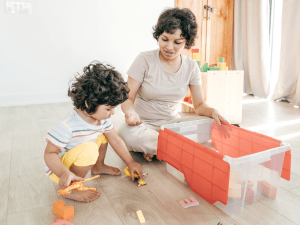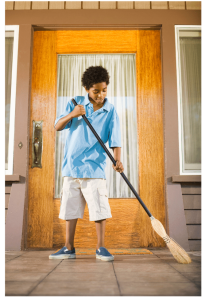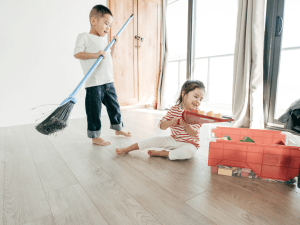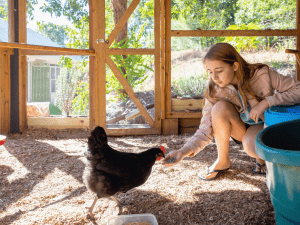Have you ever felt overwhelmed with housework? Do you have kids? If you answered "yes" to these questions, we have a few ideas to share with you. According to the American Academy of Child and Adolescent Psychiatry (AACAP), chores are routine and necessary tasks that provide benefits for children. Setting chore routines with kids as early as age 3 can lead to higher self-esteem, responsibility, and kids being better equipped to handle frustration, adversity, and delayed gratification. Other benefits include:
- Learning time management skills.
- Developing organizational skills.
- Accepting responsibility in the family.
- Providing an opportunity for success (especially helpful if this is an area of struggle for your child).
- Learning how to balance work and play from a young age.
- Setting a good foundation for being able to function independently.
All of these skills can contribute to your child's success in school, work, and relationships for years to come. We know that chores are good... but where do we start? Here are some tips provided by the AACAP for introducing chores to your kids:

-
Set clear and reasonable expectations.
- "Please put your breakfast dishes in the sink/dishwasher after you are done eating."
-
Establish regular routines.
- At the same time each day, have the kids complete one chore—before dinner, at bedtime, etc.
-
For young kids, focus on small, manageable chores by making up fun songs or games while you model the correct behavior.
- "Let's find 10 things we can place in this basket that do not belong in the family room."
- Find or make a family-friendly playlist of your favorite music on a streaming platform like hoopla.
-
Start a reward system or find an app that will help monitor progress and encourage good behavior.
- For example, stickers on a daily chart that leads to a reward at the end of a predetermined time frame.
-
Lead by example.
- Kids will naturally jump on board to help if they see their parents modeling the same behavior.
-
Give positive feedback.
- "Great job weeding the front walkway! I appreciate your work."
-
Pick your battles carefully.
- Sometimes socks on the bedroom floor are not the end of the world. Start fresh the next day.
- Sometimes socks on the bedroom floor are not the end of the world. Start fresh the next day.
Here are some age-specific chores for kids as recommended by the AACAP.
Ages 3-4
- Put away toys.
- Dress themselves (with help as needed).
- Help put away groceries.
- Pair socks.
- Organize family shoes.
Ages 5-6
- Feed pets.
- Make beds (with help as needed).
- Help clear dinner table.
- Wipe down surfaces.
- Water outdoor plants.
 Ages 7-8
Ages 7-8
- Unload dishwasher.
- Help with meal prep.
- Pack their lunch.
- Put away laundry.
- Sweeping and light mopping.
Ages 9-10
- Change bed sheets.
- Clean bathroom.
- Yard work.
- Clean kitchen.
- Walk dog/clean litter box.
 Ages 11-13
Ages 11-13
- Babysit for a short period of time (depending on maturity and first aid basics completion).
- Clean and organize pantry or refrigerator.
- Help with holiday decorating or take-down.
- Organize mail and help with recycling.
- Wash car and do laundry.
 Ages 14 and older
Ages 14 and older
- Help with grocery shopping.
- Meal preparation.
- Babysitting.
- Home repair help.
- Online shopping and price comparison (grocery acquisition planning).
Remember that all good things take time, and your kids cannot mature overnight. Even with good intentions and planning, things can go poorly, and that is okay—you are still a great parent!
If your kids are completely unwilling or unable to help around the house, it can be frustrating and spirit breaking at times. Try to talk with your child to understand why they hesitate or refuse. Show empathy. If problems still persist despite all of these things, it could be a sign of other issues your child may be experiencing. Talk with your pediatrician or family physician for more suggestions and support. You can also ask for referrals to qualified mental health practitioners if you or your child need other supports.





Add a comment to: 5 Appropriate Chores for Each Age